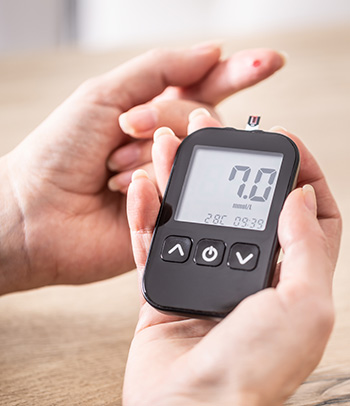Obesity and diabetes can be controlled and managed through lifestyle changes and regular care from your health care provider.
When you think about a public health crisis, you might think about a fast-spreading infectious disease like COVID-19 or a widespread problem such as the opioid epidemic. But what about obesity rates?
Obesity is a serious chronic disease that continues to increase at alarming rates in the United States. According to the Centers for Disease Control and Prevention (CDC), obesity rates are above 40% and obesity is the leading risk factor for type 2 diabetes, one of the leading causes of preventable, premature death.
Learn more about obesity and diabetes, their unhealthy connection, and the lifestyle modifications and resources available to help you manage and control them.
A Close Look at the Numbers
Obesity
Obesity is a common, but serious chronic disease that occurs when an individual’s weight is higher than what is considered healthy for his or her height. Many factors contribute to the rising rates of obesity in the U.S., including jobs that involve sitting for long periods of time, busy schedules that make cooking fresh, healthy meals difficult, financial issues that limit the number of healthy foods we can buy, and much more. People who are obese, compared to those with a healthy weight, are at increased risk for many serious diseases and health conditions, such as type 2 diabetes, high blood pressure and high cholesterol, breathing problems, joint problems, stroke, many types of cancer, and more.
Diabetes
The CDC provides these health statistics. About 38 million people in the U.S. are living with diabetes and 98 million adults have prediabetes. Diabetes is a chronic health condition that affects how your body turns food into energy. Over time, this can lead to serious health problems such as heart disease, vision loss and kidney disease. According to the CDC, diabetes is the eighth leading cause of death in the U.S. and that number may be underreported.
Despite these alarming numbers, obesity and diabetes can be controlled and managed through lifestyle changes and regular care from your health care provider.
Combating High Rates of Obesity and Diabetes
Health outcomes, including obesity and diabetes rates, are influenced by a number of different factors, including our genetics, our ability to access care, our access to healthy affordable foods and safe places for physical activity, and much more. With all of this in mind, here are some suggestions for combatting the high rates of obesity and diabetes:
- Make preventive care a priority. Accessing primary care services on a routine basis is an important part of your health care. This helps you detect health conditions early on when they’re more treatable and stay up to date on vaccines and screenings. Learn about the benefits of routine care by checking out Visit Your Health Care Provider Regularly for Better Health.
- Talk to your health care provider. It’s important to have a trusting, open relationship with your health care provider. Discuss which screenings you should get and what health conditions you’re most at risk for. Go over your family history together so your provider knows what health conditions run in your family. Consider sharing information about your lifestyle, the food choices you make, or whether you smoke or use alcohol. Be prepared for your visits to get the most out of each appointment.
- Learn more about your health conditions. If you’ve been diagnosed with diabetes, for example, learn more about the disease and how you can manage it. Learn what makes the condition worse and what steps you can take to improve your overall health. Check out these diabetes patient education materials for information on nutrition labels, budget-friendly cooking, carbohydrates and more.
- Follow your treatment plan. If you’re on medication to lower your blood pressure, for example, it’s important to understand why and to follow your treatment plan. If you’ve been asked to lose weight, follow the recommendations for how to achieve your goal. If you’re struggling to follow your treatment plan for any health condition, talk to your health care provider and figure out a way to ensure you’re taking good care of yourself.
- Make small, manageable changes to your lifestyle. The American Diabetes Association recommends that you set realistic goals and make healthy changes in small steps. This might include making a commitment to eat a healthy breakfast every day, agreeing to take a 15-minute walk after work or joining a beginner yoga class at your local Department of Veterans Affairs (VA) facility.

- Eat a healthy diet. The food choices you make every day have a big impact on obesity and diabetes control. Choose a diet filled with a variety of vegetables and fruits, whole grains, lean proteins, and low-fat and fat-free dairy products. If you’re struggling with your food choices, have you tried consulting a dietician or someone who can help?
- Address obstacles that may impact your ability to manage your health successfully. Are you having difficulty getting to and from your health care appointments? If so, try exploring telehealth options that may work better for you. Are you struggling to afford healthy food options? Get information about food assistance programs you may qualify for.
- Set a weight loss goal. If you’re overweight, even a small weight loss goal can have a dramatic effect on your overall health. But losing weight can be difficult. It’s hard to know where to start or what changes will work best for you. Let VA’s MOVE! Weight Management Program help.
- Get moving. Physical activity can help you control your blood glucose levels, your cholesterol and help you maintain a healthy weight. Check out these physical activity guidelines to see how much movement you need each week. If you need inspiration, Do Your Best to Find Ways to Be More Active is full of good ideas for getting started.
- Get enough sleep. According to the CDC, one in three U.S. adults isn’t getting enough sleep and over time, this can increase your risk for type 2 diabetes, obesity, heart disease and depression. If you have diabetes already, too little sleep negatively affects how you manage it, including how much you eat, what foods you choose to eat, how you respond to insulin and more. Check out How Much Sleep Do I Need? to figure out if you’re getting enough sleep each night and use these strategies to help you sleep better.
Resources
Good health begins with your lifestyle choices, but there are so many resources available to support you along the way. When it comes to controlling your diabetes and combatting obesity, you’re not alone.
- VA’s Diabetes Self-Management Education and Support Program helps people with diabetes gain knowledge and self-management skills to better manage their diabetes. It’s an interactive process engaging the person with diabetes, their family and a certified diabetes care and education specialist. Each class includes a handbook with topics such as eating healthy, being active and monitoring your diabetes.
- VA’s Registered Dietitian Nutritionists are available to help you manage your diabetes through nutrition therapy. Review your eating habits, learn how to eat smarter and healthier and create a personalized nutrition plan with foods you enjoy.
- VA’s Weight Management Resources page includes some helpful resources related to weight management with topics such as how to increase your vegetable intake or make a healthy smoothie.
- VA’s MOVE! Weight Management Program is designed to encourage healthy eating, increase physical activity and promote even small weight losses. A MOVE! care team works to help you reduce health risks, improve your quality of life and live longer.
- The CDC offers a lot of helpful resources for preventing diabetes, including a prediabetes risk test, simple lifestyle modification tips and more.
Obesity and diabetes can be managed and controlled to ensure you are living the life you envision for yourself. Reach out for support today.







